Blockchain: From a school project to the business world
As I have already mentioned in a [previous post](link:/en/blog/blockchain-training-engineers-of-tomorrow/), the partnership between Talan and EPF made me discover the role of a trainer. But we went further by proposing a long-term project to a group of 5th-year students.
Shared expectations
Before diving into professional life through the end-of-studies internship, students must confront the business world through a 5-month project. Between the school project and the real project, it is an opportunity to put into practice the acquired knowledge and discover the "real" work methods of a company.
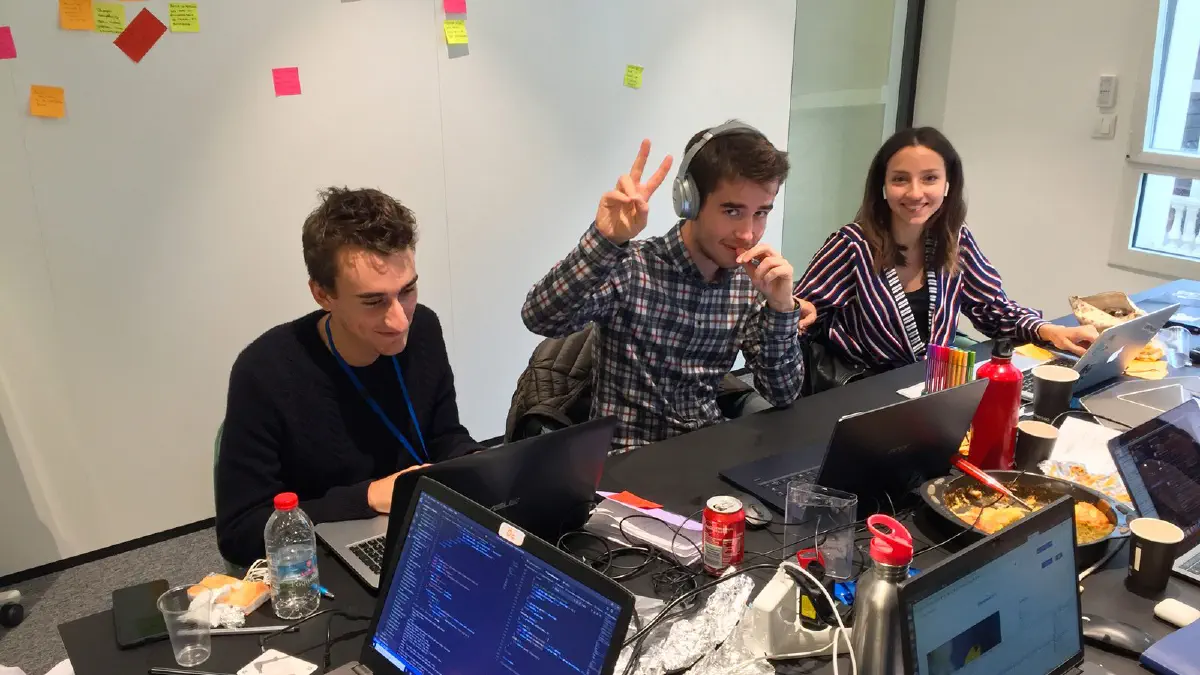
Obviously, these pedagogical expectations interested us because it allows us to face the challenges raised by a blockchain project, which we don’t always have time to implement otherwise.
For this, we needed to move away from a purely academic project, in other words, a "disposable" one, and focus on a subject that would engage both our teams and the students.
The Share2Gether project
Unlike the one-day creation of a voting system that we implemented during the initial training, we wanted a much more comprehensive and long-term project. And because using blockchain technology just for the sake of using it doesn’t make much sense, we needed to imagine a plausible use case.
This is how the Share2Gether project was born, aiming to offer an event organization solution, similar to what [Meetup.com](https://www.meetup.com/) provides. Indeed, when hosting different meetups in our premises, we have regularly encountered "no-shows," which means registered participants who do not attend the event without bothering to free up their spot.
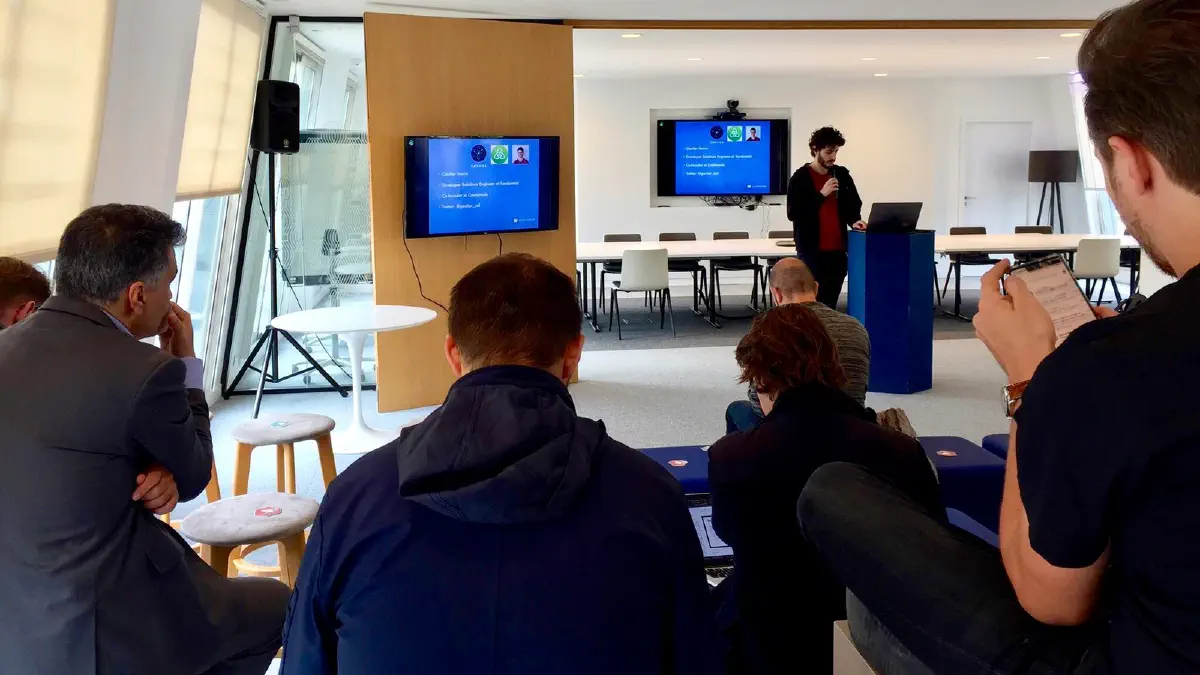
While this behavior is known to event organizers, it is nonetheless frustrating, as it raises issues such as food waste when ordering a buffet or prevents people who genuinely want to attend from doing so, finding events falsely marked as full. All types of events are affected, including blockchain-oriented meetups.
Through a reputation system, including bonuses and penalties, we aim to encourage registered participants to attend or at least prioritize canceling their registration to provide the organizer with a clear count of participants.
Imagining an organization
Starting from the product idea, we quickly imagine a technical implementation, the technologies to be used, etc. But it is necessary to convey these ideas to the students and, above all, make them want to take ownership of the project.
Convinced of the values advocated by [Talan Labs](https://blog.talanlabs.com/) regarding work methods (solidarity, continuous improvement, etc.), it was natural to take advantage of this opportunity to transmit the principles of agility to the newly formed team.
But the method alone is not enough! During the first year of the project, we gradually discovered that certain fundamental concepts were not addressed in the students' academic curriculum. Design thinking, source code management, automated testing—there were many diverse topics that required targeted training during the project, mainly at the request of the students themselves.
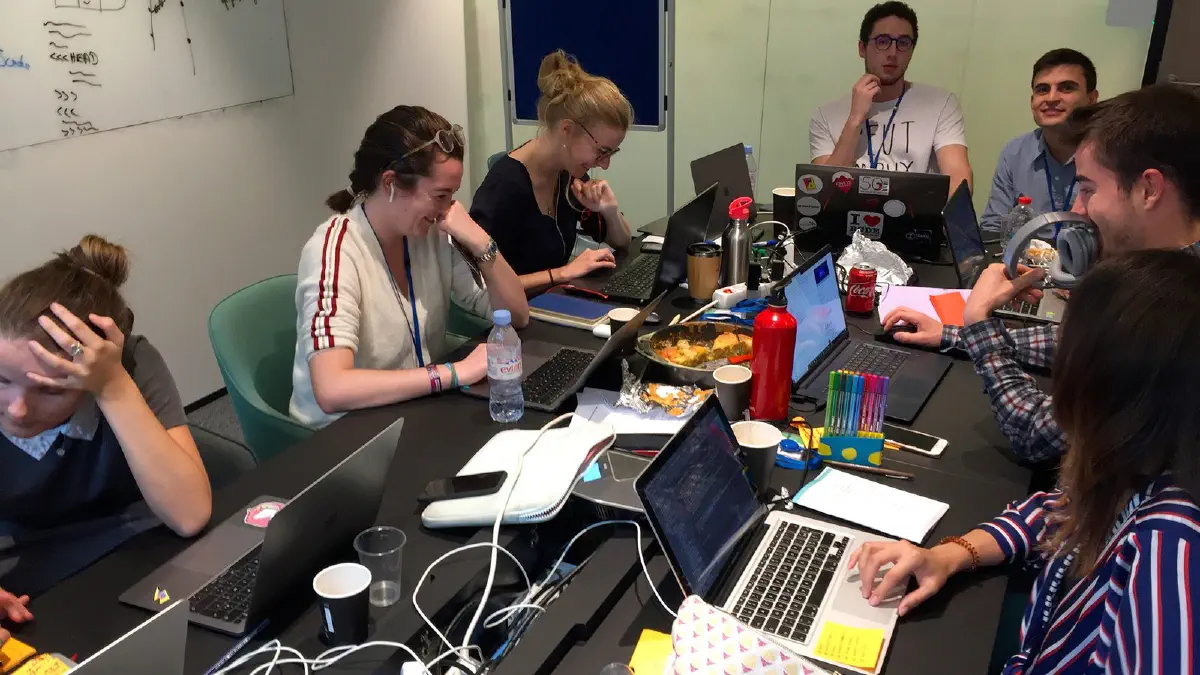
In order to anticipate these questions during the second year of the project, we proposed to the 2020 cohort of students to attend these training sessions from the beginning. Naturally, there is a significant gap between the theory of "writing tests is necessary" and its practical application during development. Nevertheless, the idea of the essential nature of tests was firmly ingrained from the outset.
Once the foundations were established, a routine could be established, punctuated by agile meetings. Every Wednesday, the students had a dedicated room reserved for them, but they could easily seek the assistance of Talan Labs employees present in the surrounding areas. This proximity also allowed them to catch a glimpse of the daily life of a developer and the dynamics of a project team.
From struggle to mastery
These two years of the project shared certain characteristics, starting with a challenging initial period for the students. New languages, new technologies, an unfamiliar work method… all of these were obstacles to overcome.
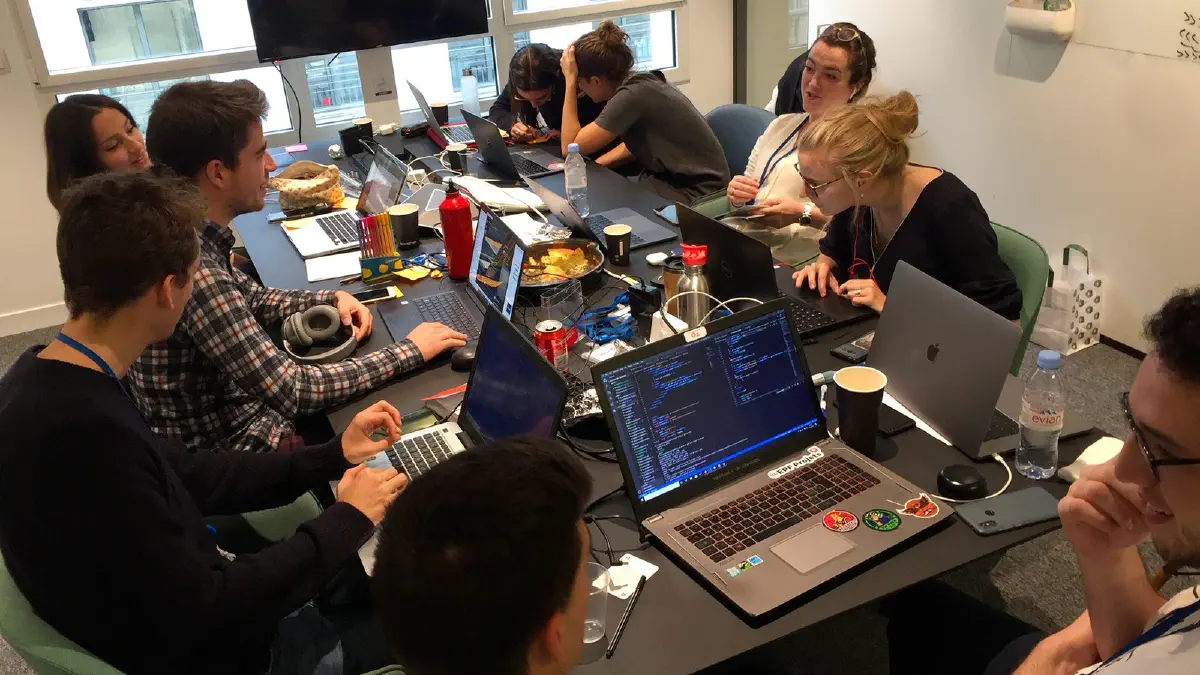
This is undoubtedly the main value we wanted to convey: even lacking confidence and doubting the teachings of the school, the students are capable of working "for real" and creating value. At the end of the project, the students' feedback was unequivocal:
They were happy with the results achieved and almost surprised by how much they had accomplished.
In retrospect, we can say that we did not expect such feedback. We aimed to train students by providing them with new skills, but what made the most difference was the conveyed confidence. Before mastering new technologies like blockchain, the engineer of tomorrow must have confidence in their abilities (including their ability to learn and discover).
A successful presentation… and it’s done!
What would a school project be without a final presentation? We believed it was important to cultivate these presentation skills just as much as technical skills. That’s why we offered the students several "mock" presentations of their final presentation.
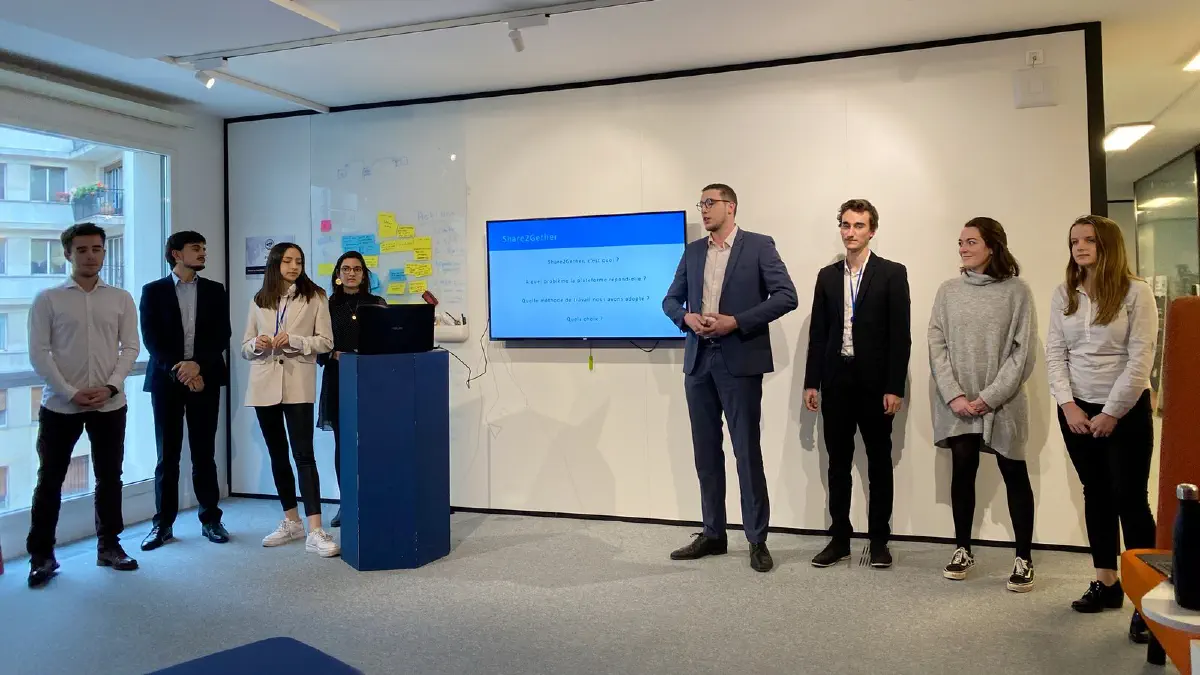
First among ourselves, to identify the points expected by the school and the main messages to convey. Then, in front of a few colleagues who hadn’t followed the project in detail but could identify any overlooked messages, while the designers would provide advice on the presentation materials themselves.
A new addition this year, as we had time at the end of the project: a presentation to Talan Directors. Our HR Director, Communications Director, and even the CEO of Talan Labs were able to attend the students' presentation. And what a presentation it was! If there’s one strength that an EPF generalist engineer has, it’s the ability to convey messages with conviction and clarity, sometimes even with humor.
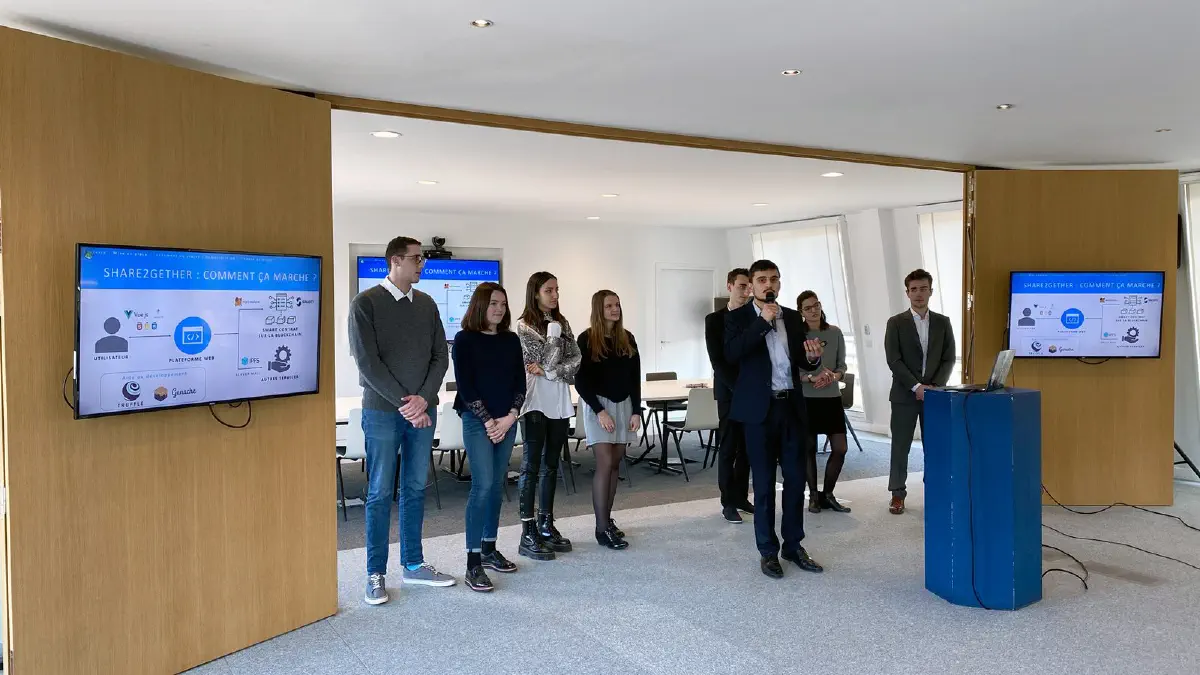
With this experience, which they admitted was more stressful than usual presentations, the students were able to deliver a high-quality final presentation to their professors and supervisors. For two consecutive years, I had the pleasure of seeing the supervised groups succeed in their presentations and express genuine joy when talking about the work they had done.
A promising future
Between the training provided in the 4th and 5th years (discussed in a previous post) and the Share2Gether project, Talan Labs has made a significant investment, which is undoubtedly not without interest. By showcasing our skills and mindset, providing confidence and knowledge to the students, we also wanted to inspire them to join us.
Therefore, it is with pleasure that we now count new EPF engineers among our ranks (from internships to permanent positions). And we don’t plan to stop there: the upcoming years will be just as eventful!
Find the article presenting the Blockchain training provided at EPF since 2018 and all the articles on the #blockchain topic!